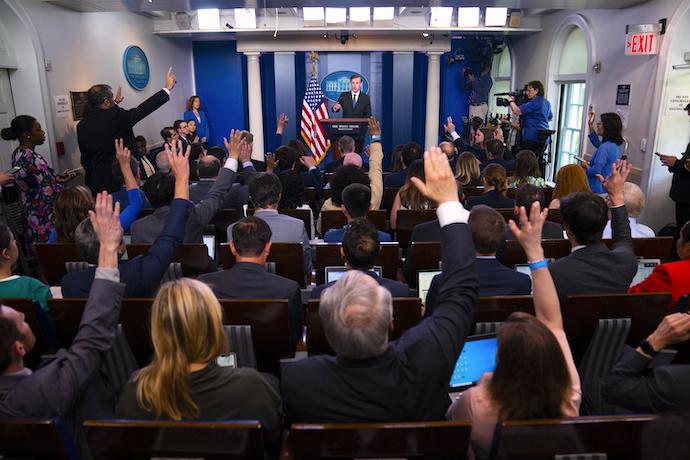In light of the likelihood that the GOP-stacked Supreme Court will rule in favor of Mississippi’s 15-week abortion ban in Dobbs v. Jackson Women’s Health—and the immense harm that such a ruling will do, whether or not it comes with the outright overturning of Roe v. Wade—you would think that the shapers of press narratives around this issue might take care not to make matters worse with their framing. But you would be wrong. Again.
Take Time’s article, “Supreme Court Signals It’s Ready to Limit Abortion at Historic Arguments.” I find myself already cringing at the inclusion of “historic” in the headline. We face an almost 100% chance that the current radicalized SCOTUS will either overturn Roe or gut the viability standard reaffirmed by the 1992 case Planned Parenthood v. Casey, thereby rendering Roe meaningless and harming countless women. It’s not that it isn’t historic, it’s that the word “historic” has inescapable heroic connotations that shouldn’t be ignored, and it’s those connotations that make it inappropriate here.
Far worse, however, is Time’s statement that “The Court has grown more conservative over the last few years,” and the addition of the clause “as former President Donald Trump nominated three justices” does little to help.
Time starts out here by telling us, more or less, that the Supreme Court’s authoritarian politicization just sort of happened, making the whole thing seem tamer by referring to it as a process of becoming merely “more conservative.” And while the mention of Trump’s Supreme Court nominations may slightly mitigate the impact of this passive language, what’s omitted is even more significant. Nowhere does the article mention Mitch McConnell or Merrick Garland, let alone any discussion of the allegation that Justice Brett Kavanaugh likely perjured himself during his confirmation hearing.
In short, Time completely elides an unprecedented set of political actions, in which Republicans—Senate Minority (then Majority) Leader McConnell above all—blocked President Barack Obama’s 2016 nomination of current Attorney General Garland to fill the Supreme Court seat vacated by right-wing Justice Antonin Scalia’s death on the basis of a bad faith argument, and then turned around four years later to rush through the appointment of radical charismatic Catholic Justice Amy Coney Barrett to fill the seat of the late Ruth Bader Ginsburg, a reliable liberal vote—thus ensuring that Trump was able to stack and politicize America’s high court.
When you truncate that series of events into something that simply “happened,” or that happened because Trump appointed three justices (with no mention of the right-wing malfeasance that allowed that to happen), you are simply not framing your story responsibly.
Meanwhile, The Washington Post and its affiliate publication The Lily (“a destination for stories central to the everyday lives of millennial women”) have been busy painting anti-choice women leaders in heroic terms. For example, in mid-November WaPo printed a glowing puff piece about Christian Right activist Aubrey Schlackman and her “vision” for a maternity ranch in post-Roe Texas, waxing poetic about “a new era in America when the church would establish a kind of Christian social safety net where motherhood was not only supported but also exalted as part of God’s plan for the universe.” The article makes only one brief mention of the pervasive abuse that has been, and still is, associated with such institutions, downplaying it as something that “sometimes” happened.
In many American states, institutions like this can use their Christian affiliation as a get-out-of-oversight-free card, which, combined with their paternalistic values, is a perfect recipe for abuses of all kinds. In addition, these institutions exhibit a pattern of coercing young mothers who may want to raise their babies into signing their parental rights away. That practice was common during what historians of adoption call the Baby Scoop era (roughly 1945 to the early 1970s), and I wouldn’t be surprised to see “scooping” make a comeback in a post-Roe America.
As for The Lily, its editors and writers seem determined to embody the worst of white feminism. Take, for example, their heroic portrayal of Mississippi State Attorney General Lynn Fitch, whom the outlet bills as “the woman who could bring down Roe v. Wade.” Although there is a little bothsidesism, in which the article quotes an expert on the harm that denying the right to abortion care will do, in particular to less privileged women, it mostly appears to take Fitch’s upside-down definition of “women’s empowerment” at face value, effectively redefining the term to mean “bootstrapping and paternalism.” And here, too, readers are given a pat on the head and told that everything will be fine since families and churches will take care of those in need:
Fitch does not support government-mandated paid family leave or subsidized child care. She believes the approach should be more ‘holistic.’ Friends, family and employers need to do all they can to help new mothers, she said. Charities can be excellent resources too, she added.
The United States is facing a crisis of democracy, with key human and civil rights under severe threat in a period of right-wing backlash. And yet the press, which should be working to uphold civil society and the common good, far too often uncritically adopts the framing of bad-faith authoritarian actors, thus making the situation worse. Framing matters. Sadly, the major media gatekeepers either don’t understand this, or they don’t care. Frankly, I’m not sure which is worse.





